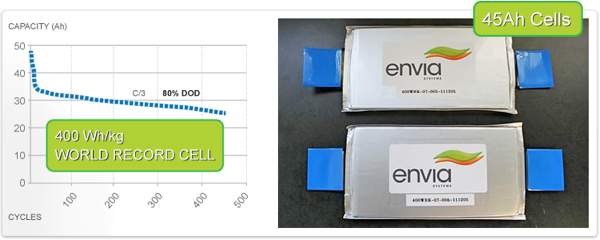Envia: Record Battery Energy Density in Context
Posted by Big Gav in batteries, electric vehicles, energy storage, envia, gm, lithium ion batteries
Jamais at Open The Future has a look at Envia's advanced lithium ion battery technology - Record Battery Energy Density in Context. More commentary can be found at REnew Economy, The Falls Church News Press and Cryptogon.
A tech company called Envia Systems has announced that it is able to produce rechargeable lithium-ion batteries (Li-ion, i.e., the standard kind of rechargeable batteries that go in everything from phones to electric cars) with a world-record energy density of 400 Watt-hours per kilogram! (Gigaom has lots of info, and useful background material.) Cool, right?
Yes? No?
Energy density is one of those really important concepts that not many people know about; it's not an exaggeration to say that a viable renewable energy future depends upon boosting energy density of batteries.
But it's hard to evaluate the importance of an announcement like this if you don't have context, so here you go:
Okay, 400 Watt-hours per kilogram (henceforth Wh/kg) means that one kilogram of battery material will be able to pump out electricity at a level of 400 Watts for one hour.
According to Envia, the best commercially-available Li-ion battery has an energy density of around 245 Wh/kg, so this new technology almost doubles that. This is good. Moreover, most Li-ion batteries operate at about 100-150 Wh/kg. The batteries in the Nissan Leaf, for example, have an energy density of about 120 Wh/kg (24 KWh/200kg). Tripling that density would, in principle, triple the range of the Leaf, taking it from around 100 miles to around 300 miles, a range close to a typical gasoline-powered car. This is very good.
But it's not revolutionary -- it's a (significant) incremental improvement.
That's because, even at 400Wh/kg, batteries still don't have an energy density anywhere close to fossil fuels.
Gasoline offers somewhere around 12,000 Wh/kg, 30x the energy density of the Envia battery technology. A Nissan Leaf with the same mass of gasoline-equivalent superbatteries would have a range of around 9,000 miles. Alternatively, to get the same 300 mile range as with the Envia batteries, the Nissan SuperLeaf would only need around 3kg of batteries.
I'm not discounting the importance of this breakthrough, not by any means, but it's important to keep this in context. There's a good reason why petroleum has such a hold on the world of transportation, and it's going to take a lot more than a tripling of battery energy density to beat it. Or, more to the point, moving beyond the gasoline automobile is going to take more than simply chipping away at energy density comparisons -- it's going to take a complete re-thinking of what we mean by transportation.
[UPDATE:]
As has been pointed out to me, in comments and in direct communication (and with varying degrees of politeness), this isn't an entirely fair comparison. It would be more accurate to compare the combination of energy density + drive efficiency.
Most standard automobiles have an average internal combustion engine efficiency of around 20% -- that is, of the energy available in the fuel, about 20% is eventually translated into motive force. So that 12,000 Wh/kg is effectively "only" 2,400 Wh/kg.
Electric motors, conversely, are extremely efficient at translating available energy into motive force; at 90%, that 400 Wh/kg Envia battery is still effectively 360 Wh/kg.
So a gasoline engine system 6.67x better than the Envia, not 30x better. The difference isn't as gobsmacking, but it's still significant, and remains a reminder of just how far battery technology has yet to evolve.






